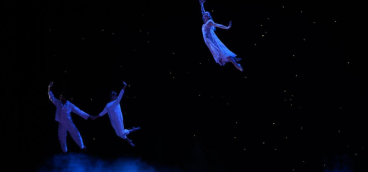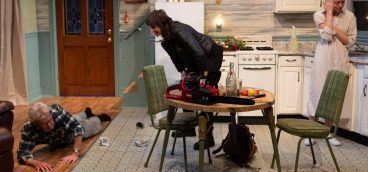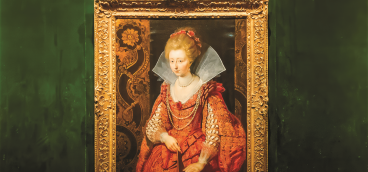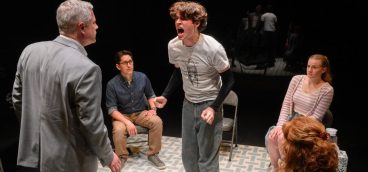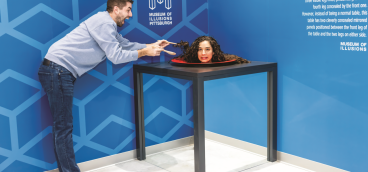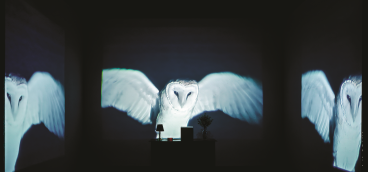Quantum’s Sleepy “Cabinet of Dr. Caligari”

In drama, interiority always triumphs over exteriority. Just look at Shakespeare (even his history plays), Beckett, or Sophocles. And mystery is always stronger than explication. Who wants to be told what to think?
But with Quantum Theatre’s new production of “The Cabinet of Dr. Caligari” we find an inversion of these principals, in that the playwright, Jay Ball, has taken us so far outside the interiority of the action presented, and in such a tendentious manner, that it felt more like the characters were reciting his program notes than serving their roles. In fact, as an ardent admirer of the 1920 silent film that this play is based upon, I wish he had utilized another naming convention, as this creation has so little to do with its cinematic antecedent that it’s actually misleading. That’s not to say that we shouldn’t remake such masterpieces; rather, we shouldn’t use them as a titular crutches.
The original film is considered a milestone of German Expressionism, as well as a seminal work in the horror genre, and a brilliant, early evocation of surrealism. It’s dark, sinister, utterly innovative and, just when you think the dénouement has transpired, it hits you with a twist that challenges anything Hitchcock ever did in psychological intensity. One might argue that if it wasn’t for “The Cabinet of Dr. Caligari” in 1920, there would have never been a “Psycho” in 1960.
There is, however, a lot to like in this play, but the disparate elements of set, video projection, lighting, and acting style never seem to jell; instead, it suffers from a kind of negative gestalt, as if all these pieces were designed for separate productions and mixed together like a postmodernist smoothie at some hipster juice bar.
I’m not sure director Jed Allen Harris could have made something homogeneous out of the playscript; you’re either onboard with the premise or you’re not. According to the program notes, the original story – about a mad doctor who uses a somnambulist to murder people – is lifted out of its contemporaneous World War I setting and placed in the Weimar Republic, and then presented as a stage adaptation by the Berliner Ensemble (founded by legendary director Bertolt Brecht) and furthermore, set in 1970s East Germany. Got that? Holy confusing double flash-forward, Batman!
Although performed in the elegant theater inside the Union Trust Building — which is very comfortable and offers unrestricted views of the raised proscenium stage — this is probably the last place you’d want to see a horror story, in such an open, brightly lit setting. It begs for a cramped, dim, black-box mise-en-scène. And lighting designer C. Todd Brown kept the house lights up for much of the show, further thwarting the tenebrous sensation such a tale demands. On top of this, Yafei Hu’s predominately white and linear set stood in strong contrast to the dark and non-linear set of the original film, which was its defining feature, and so thoroughly contributed to its creepy ethos.
I suspected as I sat there that the joke was on me, that these scenic depictions were Brechtian alienation devices meant to “awaken” the audience to the realization that this was a theatrical spectacle, as Brecht so famously would do. Especially as he also appears as a character. (And even more so as the tagline on Quantum’s advertising poster literally reads, “Wake. Up.”). If so, score one for cleverness, and I’ll concede the point. But at what pyrrhic cost?
Director Harris had his actors utilize an oratorical style; speeches were often directed at the audience in an unemotional tone, evoking a Robert Bresson-like flavor which again may have had some underlying rationale but left me – and apparently others, as I heard someone actively yawning – fighting off boredom near the end of this intermission-less performance. It’s not that the acting was bad; rather, it came across as incongruous with the subject matter.
Running like a cool film-school project over the stage throughout the evening, Joseph Seamans’ video projections were indeed arresting and inventive. I haven’t seen the intensive use of such mixed media for nearly a decade – when it was all the rage — but was grateful for this intrusion into the monochromatic character of the action, which in a way acted like a kind of reverse-alienation device. Maybe we weren’t really watching a play, but a film that wanted to be live drama. Was this the real twist of the evening? I’m not sure. You’ll just have to see for yourself. As long as you can stay awake.
THE CABINET OF DR. CALIGARI continues through November 24th at the Union Trust Building, Downtown. $20-68. 412-362-1713 or www.quantumtheatre.com


